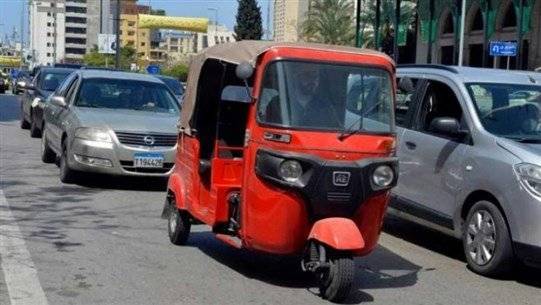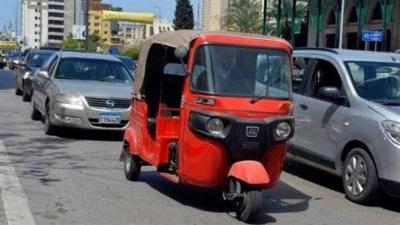Between the "Tuk Tuk" and the taxi, the profession has been lost. The village taxi is no longer operational; drivers find it hard to randomly pick up a customer, as all passengers prefer the "Tuk Tuk" even if it is illegal because it is cheaper, and the ride inside it is so enjoyable, as described by Safaa, who has become accustomed to riding it these days. "We can no longer afford high transportation fares, and most taxi drivers charge exorbitant prices."
It seems that the era of taxis is gradually diminishing, as it is the time of the "Tuk Tuk." Mohamed Ali, a taxi driver on the Nabatiyeh village route, struggles to comprehend what has happened, but to no avail. He says, "We are currently being fought against by the illegal ‘Tuk Tuk,’ while we pay a million per month for insurance and other requirements. Our situation is pitiful; even the syndicate hasn’t supported us against the ‘Tuk Tuk’ taxi phenomenon, which has stolen our livelihood. They left us to face our uncertain fate, and we can no longer control anything nor produce anything."
While taxi drivers lament their plight, the "Tuk Tuk" has taken over the streets and has become a refuge for youth escaping unemployment. Many found their job opportunity today, albeit at the expense of the taxi driver who sits all day waiting for a customer in vain, as people have begun to choose the "Tuk Tuk" for being "cheaper," according to their expressions.
In the streets of Nabatiyeh, "Tuk Tuks" dominate the area, and they now have their own parking spots. They operate without a "license plate," which the taxi drivers consider “an infringement on their interest.”
Today, competition is fierce in the taxi profession. Taxi drivers have raised their fares to continue working. According to Abu Hussein, "We can no longer endure; fuel prices are constantly rising, yet the fares remain insufficient." He adds, "We feel a sense of injustice that we cannot be envious of, as if battling the state over our profession wasn’t enough, now the ‘Tuk Tuk’ has come to compete with us for our livelihood."
Mohamed prefers the "Tuk Tuk" because it is cheaper, as he must transport himself daily from his town, Al-Dweir, to Nabatiyeh. Taxis charge 50,000 to 60,000 LBP, while "Tuk Tuk" fares range from 35,000 to 40,000 LBP. Like others, Mohamed is searching for affordable transportation in an era of inflation and monopolies; thus, he turned to the "Tuk Tuk" even though he fears it because it is less sturdy. "But what can we do?"
The taxi sector has suffered a serious setback; it is one of the professions that has no means to withstand. They have started to collapse one after another, and village taxis, which had remained resilient during the past period albeit not at the same pace, are now at the mercy of competition from the "Tuk Tuk," which has invaded villages and streets. Everyone has found their chance, even if it's just "a little," as today's circumstances "require us to work in anything," says Ali, who lost his job at one of the institutions due to the crisis and found in the "Tuk Tuk" his opportunity not to surrender. He acknowledges that the work is not official and that they are infringing on the profession, but the state has not left them other options. He believes in the saying, "Don't let worries accompany you, but open your door to hope," as he started to catch people's attention, and they resorted to this inexpensive means as opposed to the taxi, whose owners live through the crisis of their era.
Driver Mohamed does not hide the severity of the crisis, as he is forced to fill up petrol costing a million LBP daily, "an amount I do not generate at all. I barely manage to gather 700,000 LBP, which means we are working at a loss, and adding to our loss is the competition from the ‘Tuk Tuk.’"
Yusuf, a young man, decided to enter the taxi world. He bought a "Tuk Tuk" and started working in the villages. According to him, the "Tuk Tuk" is relatively profitable as it saves fuel, and people are attracted to anything new. In addition, with rising taxi fares, people have turned to this small vehicle, which allows customers to see the city and villages in a different way.
Thus, the taxi profession is entering an unprecedented decline. The current crisis has devastated professions and imposed new ones, as we are in an era where "the cheaper" prevails... and thus farewell to the taxi and welcome to the "Tuk Tuk."




